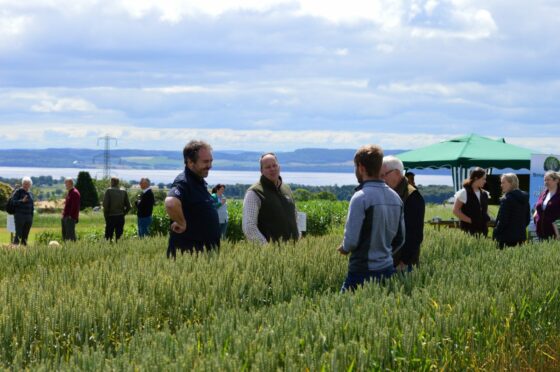A free to attend event is coming to Dundee in July to provide networking, knowledge and inspiration for farmers and the arable sector.
The event, Arable Scotland 2023: A Catalyst for innovation and future adaption, will take place on July 4 from 9am to 4pm at The James Hutton Institute’s Balruddery Farm.
Now in its fifth year, it will feature trade stands, exhibits, and plots demonstrating innovative and sustainable farming methods, and lively discussions with panels of experts.
Organisers have chosen ‘innovating for the future’ as the choice of theme for this year due to fertiliser prices and energy costs jostling for pole position.
While the weather is also becoming increasingly variable, natural resources and key organisms supporting crop production are also declining in abundance.
In the last few years, farmers have witnessed first-hand the changing climate and its potential to affect our crops.
The hot, dry summers of 2018 and 2022 saw temperatures that have been rarely experienced in Scotland, along with extended periods without rain.
These shifting weather patterns make the tasks of planning crop drilling, inputs, and harvesting much harder for farmers, and can threaten the productivity of the crop.
How are farmers adapting to the changing climate? This question will be tackled in the first ‘Arable Conversation’ of the day.
The audience will have the chance to quiz a panel of experts from farming, crop breeding, the agritech industry, and grain co-operatives.
In this opening session, the expert panel will discuss the effects of the changing climate on crop growth and farm operations – now, and in the context of the future trajectory – and horizon scan for potential threats to crops and the available solutions.
The panel will put this in the context of what farmers are doing already to make crops more resilient to prolonged periods of wet and dry weather, and extremes of hot and cold.
The audience will have a chance to challenge the panel about how necessary, practical and feasible these solutions will be, and can compare experiences to highlight the urgent priorities for research, crop breeding and agritech tools.
In the second Arable Conversation of the day, the discussion will be focused around farm businesses staying profitable on lower inputs. This session will hear from an expert panel representing farming, agronomy and research about their experiences of reduced input and regenerative methods of farming, and how they can build soil health and have demonstrable benefits to biodiversity.
The conversation will probe how applicable these methods are to Scottish arable systems and discuss where and when methods such as minimum tillage and cover crops stack up. How do alternative nutrient sources such as bulky organic manures compare with inorganic fertilisers in terms of yield and carbon footprint, and how can we reduce our reliance on pesticides without impacting profits? The audience can bring their own experiences to the conversation and pose questions to the panel.
Alongside the panel discussions, visitors will see practical demonstrations of some of the solutions proposed for climate adaptation and reduced inputs.
More than 100 field plots have been prepared by the Hutton’s farm team, showcasing results from research and development work on cereals, oilseeds, legumes, and cover crops.
In the final Arable Conversation, the panel of policy advisers and farmer groups will explore the changing policy landscape and how new policies might drive uptake of new practices and alter more established ones.
